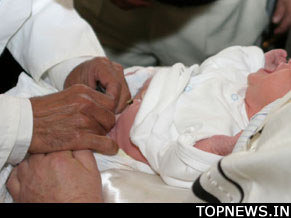Male circumcision ''cuts risk of common STDs, but not syphilis''
 London, Mar 26 : Circumcision not only protects heterosexual men from HIV, but it also helps prevent two other sexually transmitted infections - herpes simplex virus type 2 (HSV-2), the cause of genital herpes, and human papillomavirus (HPV), which can cause cancer and genital warts, says a new study.
London, Mar 26 : Circumcision not only protects heterosexual men from HIV, but it also helps prevent two other sexually transmitted infections - herpes simplex virus type 2 (HSV-2), the cause of genital herpes, and human papillomavirus (HPV), which can cause cancer and genital warts, says a new study.
However, the New England Journal of Medicine research found that circumcision had no effect on the transmission of syphilis.
"Medically supervised adult male circumcision is a scientifically proven method for reducing a man''s risk of acquiring HIV infection through heterosexual intercourse," said National Institute of Allergy and Infectious Disease (NIAID) Director Anthony S. Fauci, M. D.
"This new research provides compelling evidence that circumcision can provide some protection against genital herpes and human papillomavirus infections as well," he added.
Scientists at the Rakai Health Sciences Program in Uganda conducted the study in collaboration with researchers at the Johns Hopkins University Bloomberg School of Public Health in Baltimore, Makerere University in Kampala, Uganda, and NIAID''s Division of Intramural Research.
The team reviewed samples from two parallel clinical trials in Rakai that successfully proved male circumcision as an HIV prevention method and also assessed the surgical procedure''s ability to prevent other sexually transmitted infections, including syphilis and HSV-2.
Scientists also assessed circumcision''s effect on HPV infections, which can cause anal, cervical and penile cancers and genital warts.
The two trials involved enrolled 3,393 uncircumcised men between the ages of 15 and 49 who initially tested negative for both HIV and HSV-2. The men were assigned at random to one of two study groups: 1,684 received immediate circumcision performed by trained medical professionals in an outpatient setting (intervention group); and 1,709 received medical circumcision after a delay of 24 months (control group).
The researchers evaluated the volunteers at six, 12 and 24 months for HSV-2 and syphilis infection. Additionally, a subgroup of 697 volunteers (352 participants in the intervention group; 345 in the control group) was evaluated for HPV infection at enrollment and at 24 months.
In analyzing the effect of circumcision on HSV-2 acquisition across both studies, the researchers found that the cumulative probability of HSV-2 infection was significantly lower among those volunteers who received immediate circumcision (7.8 percent) than among those in the control group who were circumcised at 24 months (10.3 percent). Overall, the researchers found that medically supervised circumcision reduced the men''s risk of HSV-2 infection by 28 percent.
The combined results from both trials also demonstrated a 35 percent reduction in HPV prevalence among men in the intervention group. In evaluating a subgroup of volunteers at 24 months, high-risk HPV strains associated with certain cancers were detected in 42 of
233 men in the intervention group and in 80 of 287 men in the control group.
Circumcision did not, however, affect the incidence of syphilis. At 24 months, syphilis was detected in 50 men in the intervention group and 45 members of the control group. (ANI)